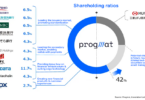Today Japan’s BitFlyer unveiled its latest blockchain offering, a shareholder voting solution for annual meetings. As a result of COVID-19, companies are running hybrid shareholder meetings where shareholders can ask questions and vote via internet video links. BitFlyer intends its solution to address the issue of securing voting and confirming identity.
The company is known for its Japanese cryptocurrency exchange. But it also has a blockchain division that works with enterprises. Last year it was announced that Sumitomo Corporation was working with the company on a home rental contract platform.
According to Crunchbase, BitFlyer raised $37.3 million in financing and its website shows big financial backers, including SMBC, Mizuho, MUFG, Dai-ichi Life, SBI, dentsu and Recruit.
In addition to providing blockchain consulting, BitFlyer also has its own blockchain “miyabi” with a custom consensus protocol. Additionally, it provides regulatory or regtech solutions.
In terms of the voting solution, “bVote” aims to prevent vote spoofing. In future BitFlyer plans to extend the application from general meetings to conferences and elections.
What is a little unusual, is the company plans to use its own bVote solution for voting at its extraordinary shareholders meeting on 26 June. Given its team wrote the code and are probably the only ones to fully understand the source code of the voting app, some might view that as a conflict.
Blockchain for proxy voting has attracted attention in Asia. A year ago, Broadridge announced its solution was to be used in a trial by ICJ, a joint venture between the Tokyo Stock Exchange and Broadridge. The solution has been used multiple times by Santander in Europe.
SWIFT also trialed a blockchain proxy voting solution in Asia-Pacific and partnered with Singapore exchange SGX and SLIB. And more recently, AST launched a proxy voting solution for mutual funds.






